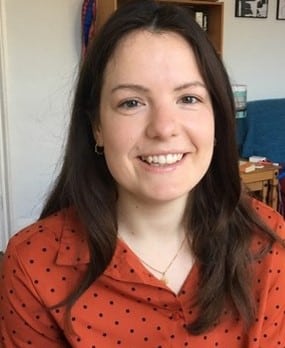Barts Life Sciences Research Data Scientist talks about her work during the pandemic

“To me, it’s fascinating and vital to the future of healthcare”
In the lead-up to International Clinical Trials Day, Sophie Williams, PhD, talks about how her work as a data researcher in Barts Life Sciences helped in the fight against Covid-19.
“At the beginning of the pandemic, there was an incredible demand from everyone – those working in healthcare, the public and the government – to know more about this new virus and what was going on in hospitals across the UK.
“To help address these demands, national and international data-sharing clinical trials – like the ISARIC trial – were set up. Along with all othera NHS Trusts, Barts Health were asked to contribute de-identified medical data about those being treated for Covid-19 in our hospitals.
“By gathering and studying de-identified healthcare data from Covid-19 patients across the world, trials like ISARIC were looking to answer questions like ‘are some people more likely to get very sick from the virus?’; ‘do people with underlying health problems have a higher risk of dying from the virus?’ etc. Having this information could help with the development and delivery of new treatments and even better care.
“Research nurses at our hospitals were tasked with gathering this medical information. But it was a big demand for them – they would have to ask doctors, nurses and patients up to 100 questions and fill the answers in on a paper form. That’s where my data research colleagues and I enter the picture.
Harnessing the power of existing data
“We knew that a lot of the medical information needed for trials like ISARIC was already available in our hospital system and databases – we just needed to make the process of extracting this information simple for our research nurses and safe for our patients, so they could feel confident their data wasn’t being misused.
“Some of the information was easier to extract from the system than others. For example, it was simple to see if a person had a well-documented underlying health condition like asthma or heart problems. But it was harder to collect information on things like how a person was when they arrived at hospital – did they have a cough? A fever? This is because this information is entered into a text box. To address this problem my team created a scanning tool that allowed us to search for words like ‘cough’, ‘fever’ etc., allowing us to get as full a picture of how Covid-19 was affecting people as possible.
“We were then sending this non-identifiable information to the researchers in the ISARIC trial, who combined it with all the other data they were receiving and used it to study Covid-19 on a massive scale. In fact, we were the first trust to send it to them electronically!
Large-scale data, real-time benefit
“Sometimes it’s hard to see the tangible benefit of data-sharing clinical trials like this. But what was so great about the ISARIC trial was that quite quickly, they pulled together a Covid-19 predictor model that hospitals could use to assess how unwell their patients were or might become. When the modelling tool became available, my colleagues and I validated it to make sure it worked ok in our hospitals (which it did!), and now it’s used by our doctors and nurses as part of their Covid-19 assessment. It doesn’t say what treatment a person should have, but rather gives them a score that predicts their likely outcome, if they might need intensive care etc. Seeing the work that we had done to harness the power of this existing data was already providing a benefit to patients was an amazing feeling. It really felt like we were helping in the fight against Covid-19.
“The information that we were harnessing and streamlining from existing systems was also available in real-time to the research community. With permission from the database holders, researchers could use it to identify Covid-19 patients within our hospitals who might be eligible to take part in clinical trials, like the RECOVERY trial. This also helped them make sure they were being representative of our local communities when recruiting patients – having as many people of all ages, from as many different ethnicities as possible in a clinical trial is incredibly important. That way, researchers can be more confident that any new treatments or tests developed work for everyone.
The future of data research
“I know people get nervous about the idea of their medical data being shared, but I want to reassure everyone that all data research is done under a strict code of ethics, with access to and sharing of this data being strictly controlled and in the majority of cases, de-identified (special requests have to be made for identifiable information).
“And I know some people find data research a bit tricky to get their head around – what it is and how it helps – but to me, it’s fascinating and vital to the future of healthcare. By harnessing, streamlining, rigorously analysing and carefully and safely sharing medical information we have among medical professionals and researchers we can learn about how diseases develop, spread, change, respond to treatment and unearth new ways to diagnose, prevent and treat lots of different diseases. I’ve seen this happen first-hand with Covid-19, and it was incredible.”

 Accessibility options
Accessibility options Translate the page
Translate the page